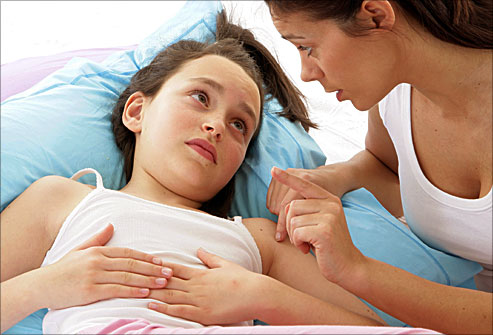“Mummy, i got tummy ache!” most often your babies cry to complain about this, but you don’t know why. Some last for a short while, but when it happen for a lifetime, you have to bring them to the hospital. They may suffered from:

Colic
It usually happen between the ages of about six weeks and three months – and between the hours of about five and ten at night. Signs include restlessness, prolonged crying, drawing up the legs, and passing wind. If you bottle-feed, it is a good idea to check that the teat isn’t too large and that you hold the bottle properly because a theory said that colic can be linked to air swallowed while sucking, and advocates of breastfeeding claims breastfed babies have less colic because of the way they suck. Another possibility is that the baby’s gut is not working smoothly yet, because it hasn’t learned to do so, and so air and gas get trapped, causing pain.
Food intolerance
Some bottlefed have trouble digesting formula, and may do better with a soy-milk substitute – but check with your doctor or baby health nurse first. It also thought a breastfed baby can be affected by what her mother consumes, whether it’s food, drinks or drugs. Cabbage, onion and dairy products are among the suspects, and both alcohol and other chemical can past to a baby through mother’s milk.
Constipation
If the stools are soft and moist, then your baby is not constipated. But if they are hard, dry and painful to pass, it’s a sign of constipation. This maybe because baby is not getting enough fluid, or in toddlers, because of a lack of fruits and fibres in the diet. Young children may also become constipated simply by ignoring the urge to open their bowels. If the problem is mild, try giving more fruits juice to babies, and fruits and high fiber foods for toddlers. But don’t give laxative, unless on your doctor’s advice.
Phantom pains
Children sometimes cannot tell their parents about their pain, but some signal that something is wrong they showed can be helpful. It is obvious when the complain comes in the morning before school. For while, the pain can be very real, the trigger may be emotional or psychological – an upcoming math test, unhappiness in the classroom, fear of being bullied in the playground – or anything that makes staying home a more pleasant prospect, such as family habit of showering a sick child with gift or special treats.
Intusseception
This happen when part of the gut pushes inside itself, rather like a finger of glove turning inside itself. It’s very painful and while it can occur in adults, tends to happen most often under the age of 12 months, with more boys than girls affected. Occasionally the condition may correct itself, but there’s a danger it will recur. Usually surgery is needed.
Since babies cannot speak out, or young children cannot explained what they suffer from, it is recommended to have a sight to their body signals or unusual scenario happen.

Leave a Reply